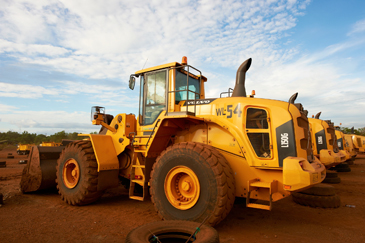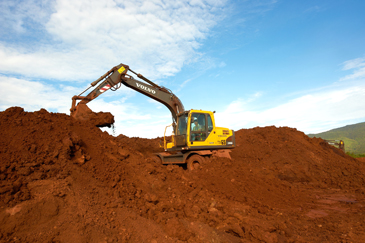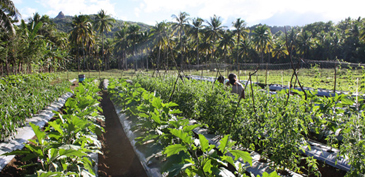Nickel Asia Corporation is one of the world's largest producers of limonite nickel. Its four mines in the Philippines extracts over 60 million tonnes of nickel a year – with help from Volvo construction equipment.

The L150G-Series stands tall and proud, ready to work
Lying between the South China Sea and Pacific Ocean, the Philippines is an archipelago of 7,107 islands and regions that neighbor Southeast Asia. Limonite nickel is currently second in world demand to sulfide nickel but is forecast to take the number one spot in the near future. Its primary use is for the production of ferronickel and pig iron that in turn is used to produce stainless and carbon steel.
Nickel Asia Corporation (NAC) is one of the world's largest producers of nickel and the biggest nickel mining company in the Philippines. It has four operating mines – Rio Tuba located in Palawan, which was established in 1975 and three others in Surigao – Taganaan, Taganito and Cagdianao – which opened in the 1980s and early 90s.
NAC exports both saprolite and limonite ore to customers in Japan and China. The Rio Tuba mine is also the exclusive supplier to the country's first hydrometallurgical nickel processing plant (a way of extracting metal from ore) called Coral Bay. Coral Bay became operational in 2005 and produces 24,000 tonnes of contained nickel and 1,500 tonnes of contained cobalt a year. It has proven to be the world's most efficient facility using the high-pressure acid leach (HPAL) process.

The rich golden earth surrounds the wheeled excavator
A sea of yellow
The company has been buying Volvo Construction Equipment (Volvo CE) machines for over 20 years and to keep up with market demand, NAC's fleet has grown to consist of 76 heavy-equipment units and 309 Volvo trucks across its mining sites. The machines drive the huge earth moving operations needed to dig and extract the nickel deposits from the mine. The heavy equipment is also used to load up the trucks with excess earth.
Just at the Rio Tuba mine, there are seven L150F-Series wheel loaders and 19 L150G-Series wheel loaders, four EC480B-Series excavators, five EC480B-Prime and two EC210 B-Prime excavators, four EC210 BLC excavators, six EW145B-Series wheeled excavators and four G900B-Series motor graders. The machines work in tandem across the site and operations run around the clock.
The Volvo L150G-Series wheel loader boasts a spacious, comfortable and safe cab, which when paired with high breakout force, shorter cycle times and low fuel consumption, increases uptime and productivity. The Volvo EC480B-Series excavator also makes a big difference on site – its Volvo diesel engine delivers lower emissions, superior performance and fuel efficiency by using precise, high-pressure fuel injectors, turbo charger and electronic engine controls to optimize machine performance. Its Automatic Idling System also reduces engine speed to idle when the levers and pedals are not activated, resulting in less fuel consumption and low cab noise levels for operator comfort.
“Volvo machines are technically and economically competitive compared to other brands and Civic Merchandising – Volvo CE's regional dealer – offers a great after sales service, which is why we prefer Volvo,” says Jose S. Saret, chief operating officer at Nickel Asia Corp. “We are definitely satisfied with our machines and will continue to do business with Volvo CE.”
Minerals with morals
In 2010 the company invested in the country's second hydrometallurgical nickel processing plant under Taganito HPAL Nickel Corporation, which is currently under construction and scheduled to open this year. It will have the capacity to produce 30,000 tonnes of contained nickel. At a total cost of $1.4 billion, the plant represents the single largest investment in the Philippine minerals sector to date.
Lateritic nickel deposits are shallow and extraction doesn't require explosives so the environmental impact is limited to ground disturbance. But each mining facility manages its environmental responsibilities through the Annual Environmental Protection and Enhancement Programs (AEPEPs), which has dedicated and qualified environmental teams in place for the rehabilitation of mined-out areas.
“We have a social responsibility to protect and improve the welfare and quality of life for residents where we operate,” says Saret. “We strive to contribute to the economic development of these communities and, more broadly, the nation. We replant trees at our mining sites and ensure sustainable growth. This is something that we have in common with Volvo CE.”
“We have been using Volvo units since 1990 because they are reliable and sturdy in terms of hard working conditions and situations,” says Philipp D. Ines, resident mine manager at Rio Tuba Nickel Mining Corporation. “They also fit in with our economic values because they are one of the most efficient machines out there.”
Source: Volvo CE
 Constructionshows
Constructionshows
